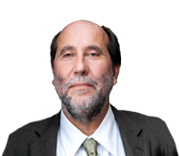José Onuchic is the Harry C & Olga K Wiess Professor of Physics and Astronomy, Chemistry and Biosciences at Rice University and the co-Director of the NSF-sponsored Center for Theoretical Biological Physics. His research looks at theoretical methods for molecular biophysics and gene networks.
He has introduced the concept of protein folding funnels. Energy landscape theory and the funnel concept provide the framework needed to pose and to address the questions of protein folding and function mechanisms. He developed the tunneling pathways concept for electron transfer in proteins.
Read More
José Onuchic is the Harry C & Olga K Wiess Professor of Physics and Astronomy, Chemistry and Biosciences at Rice University and the co-Director of the NSF-sponsored Center for Theoretical Biological Physics. His research looks at theoretical methods for molecular biophysics and gene networks.
He has introduced the concept of protein folding funnels. Energy landscape theory and the funnel concept provide the framework needed to pose and to address the questions of protein folding and function mechanisms. He developed the tunneling pathways concept for electron transfer in proteins.
He is also interested in stochastic effects in genetic networks with applications to bacteria decision-making and cancer. Further expanding his ideas coming from energy landscapes for protein folding, his group is now exploring chromatin folding and function and therefore modeling the 3D structure of the genome.
He has received much recognition for his achievements. He was elected to the National Academy of Sciences in 2006. He received the ICTP Prize in honor of Heisenberg in Trieste, Italy (1989) and the Beckman Young Investigator Award (1992). He is a fellow of the American Physical Society (1995), the American Academy of Arts and Sciences (2009), the Brazilian Academy of Sciences (2009), the Biophysical Society (2012) and the American Association for the Advancement of Science (2017). He was awarded the Einstein Professorship by the Chinese Academy of Sciences (2011). In 2014 he received the Diaspora Prize from the Ministry of Foreign Affairs and the Ministry of Industrial Development and Foreign Trade from Brazil. In 2015 he was awarded The International Union of Biochemistry and Molecular Biology (IUBMB) Medal and in 2017 he was elected fellow of the American Association for the Advancement of Science (AAAS). In 2018 he received National Order of Scientific Merit by the Brazilian National Council in Science and Technology chaired by the Brazilian President. He has just been awarded the 2019 American Physical Society’s Max Delbruck Prize in Biological Physics.
Read Less

